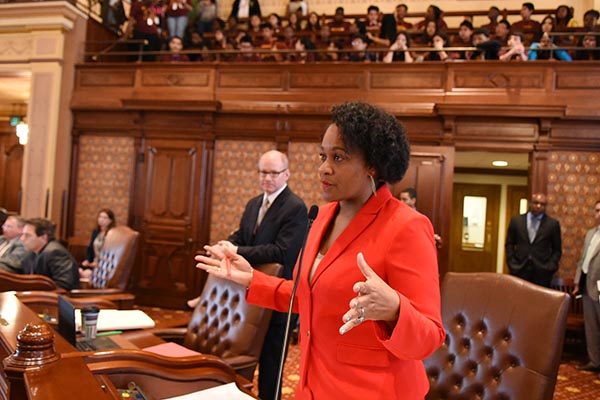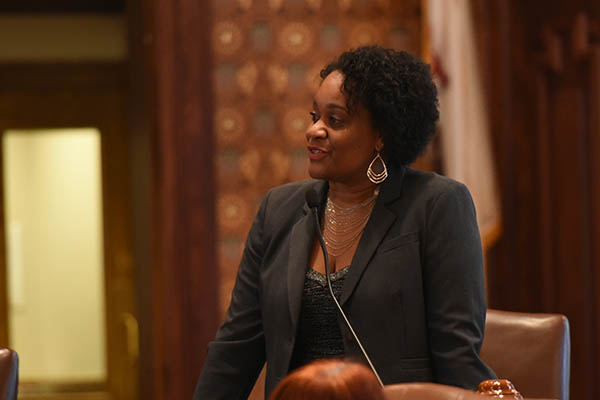Lightford: We have to continue working on education funding reform
- Details
- Category: News
 SPRINGFIELD- Continuing the conversation on much-needed education funding reform, Assistant Majority Leader Kimberly A. Lightford sponsored a measure approved by the Senate today that merges two solutions for the way the state distributes education funds.
SPRINGFIELD- Continuing the conversation on much-needed education funding reform, Assistant Majority Leader Kimberly A. Lightford sponsored a measure approved by the Senate today that merges two solutions for the way the state distributes education funds.
The measure, which passed 31-18-8, applies Senator Andy Manar’s Senate Bill 231 for next school year and introduces an evidence-based method beginning with the 2017-18 school year.
“For years, we’ve talked about the ineffectiveness of our current formula. This is a reform that invests in our most vulnerable children’s success,” Lightford said. “We need to put funds in the right place, ensuring that all children are being prepared for a bright future.”
The Kimberly A. Lightford Saturday University celebrates another class
- Details
- Category: News
 Assistant Majority Leader Kimberly A. Lightford (D-Maywood) continues her partnership with Black Star Project to host The Kimberly A. Lightford Saturday University.
Assistant Majority Leader Kimberly A. Lightford (D-Maywood) continues her partnership with Black Star Project to host The Kimberly A. Lightford Saturday University.
The University is a free tutoring program for students in fifth to eighth grade. The program provides a 12 week curriculum per semester to aid students in approving their academics.
The 2016 class celebrated the end of the 2nd semester with a pizza party, playing games, and participating in a ceremony where they were issued program certificates.
This is the fourth year that the program has operated and graduated students. The Kimberly Lightford Saturday University class of 2016 acknowledged 50 students that completed the 2nd semester.
Senator Lightford and Black Star Project are proud of the success students, teachers and parents have had through the program. Both look forward to continuing the collaboration on behalf of the program.
Lightford supports Automatic Voter Registration
- Details
- Category: News
 SPRINGFIELD— Eligible voters throughout the state will now be automatically registered to vote under legislation advanced last Thursday.
SPRINGFIELD— Eligible voters throughout the state will now be automatically registered to vote under legislation advanced last Thursday.
Senate Bill 250 would allow for the Secretary of State’s office and similar state agencies to submit eligible voters’ information to the State Board of Elections when they visit their facilities for services.
Currently, 42.2 percent of eligible, voting-age black citizens in Illinois aren’t registered to vote. Overall, more than 2 million Illinoisans who are eligible to vote aren’t registered.
The measure now moves to the Illinois House of Representatives, where it will be debated.
Assistant Majority Leader Kimberly A. Lightford (D-Maywood) released the following statement:
“Just last year we celebrated the 50th anniversary of the Voting Rights Act. This legislation resonates that same message that our democracy should ensure that voting is accessible to every eligible person.”
Grandparents Raising Grandchildren Event 2016
- Details
- Category: News
 State Senator Kimberly A. Lightford hosted her 7th Annual Grandparents Raising Grandchildren on April 24, 2016. The event recognizes the sacrifices and commitment grandparents who are raising their grandchildren have accepted.
State Senator Kimberly A. Lightford hosted her 7th Annual Grandparents Raising Grandchildren on April 24, 2016. The event recognizes the sacrifices and commitment grandparents who are raising their grandchildren have accepted.
This year, 21 new nominees were honored and joined by 120 previous nominees. The event included dinner, raffle prizes, a presentation by Attorney General Lisa Madigan’s office. Guests enjoyed entertainment by Jordan Temple Church Men of God Mime Dancers, Maywood Fine Arts and Those Funny Little People.
Oak Street Health & The Link Incorporated partnered with Senator Lightford to offer raffle prizes and offered volunteers for the event. Senator Lightford is very grateful for everyone who made the night a success. Enjoy photos from the event!
More Articles …
Page 132 of 159









